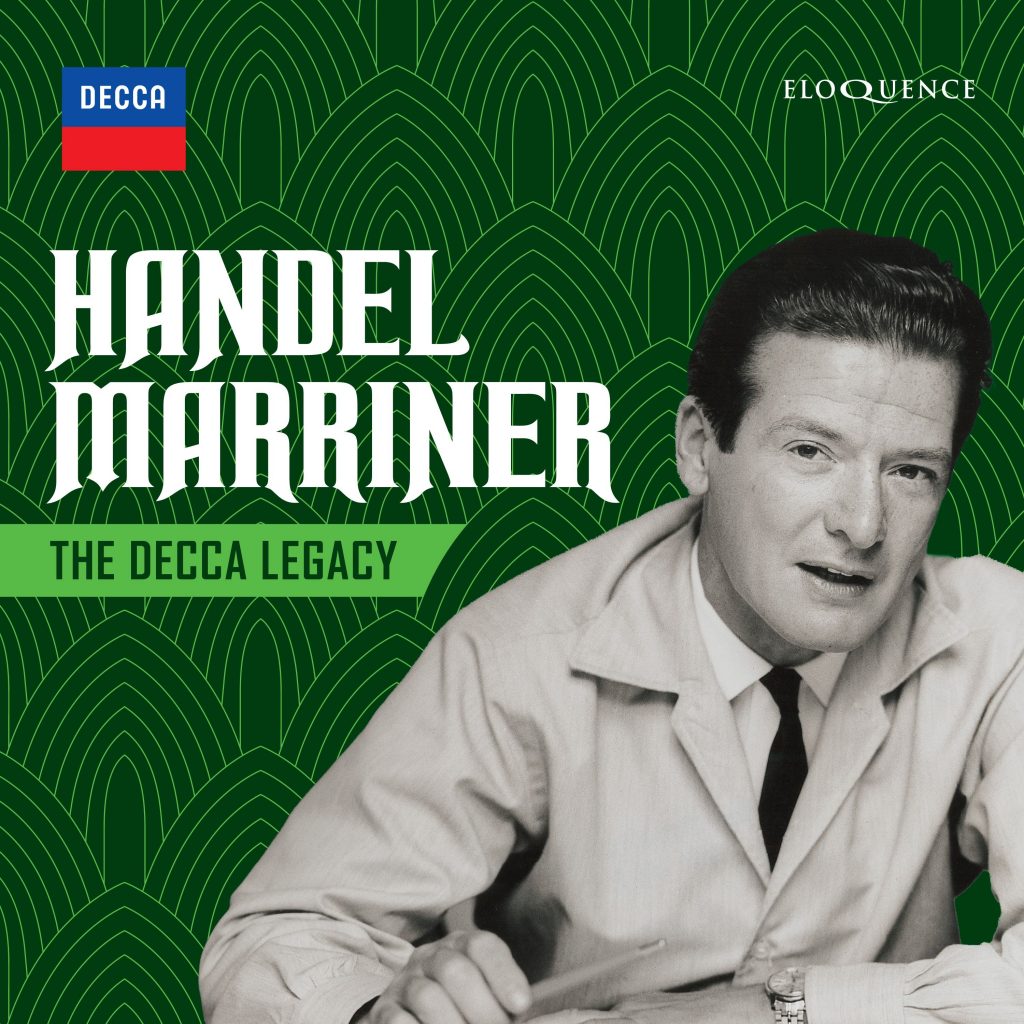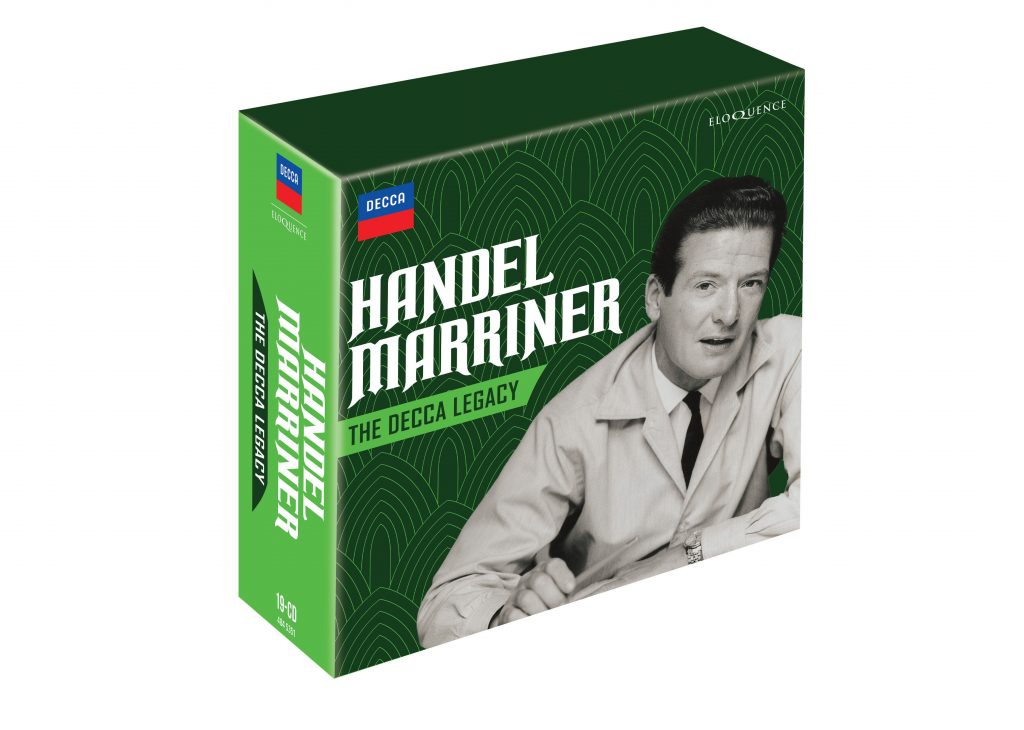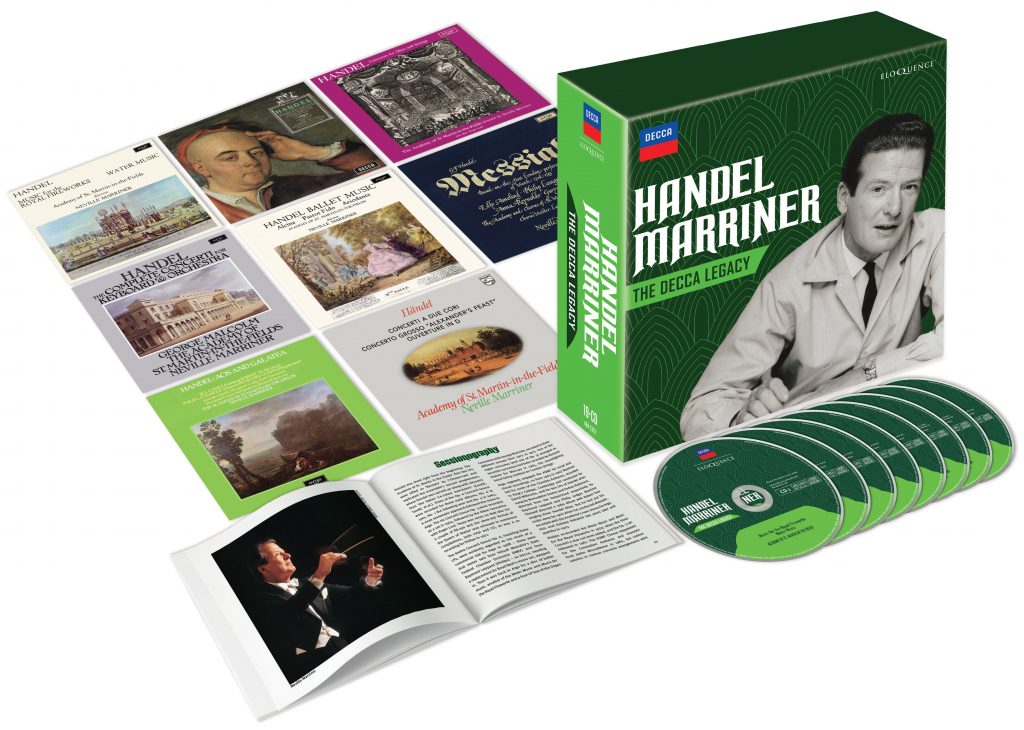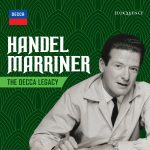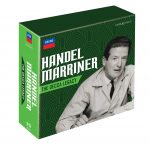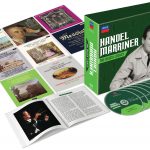LIMITED EDITION.
Even while a member of the London Symphony Orchestra in the early 1950s, Neville Marriner had made recordings for L’Oiseau-Lyre as a violinist in the Jacobean Ensemble. Accordingly he took a tape of a concerto grosso to the label’s legendary owner, Louise Hanson-Dyer. The artists on it were his new ensemble, the Academy of St. Martin in the Fields. This modest demonstration tape ultimately led to more than 500 recordings, and the success of the Academy with Marriner as the world’s most recorded partnership.
Handel was an integral part of the Academy’s work firstly for L’Oiseau-Lyre, then for Argo, finally for the Dutch label Philips. (Marriner and the Academy also recorded music by Handel for EMI.) Without including later duplicate versions, this box compiles for the first time all the ASMF/Marriner albums made for the Decca family of labels as well as Philips between 1961 and 1997, amounting to a comprehensive survey of the composer’s orchestral music, ornamented with Acis and Galatea, Messiah, Jephtha and the Coronation Anthems.
Critics from the outset praised not just the energy of the Academy and Marriner in Handel’s Concerti grossi, but also their polish, at a time when period-instrument versions were technically unreliable. Soloists such as the oboist Roger Lord emerged naturally from an ensemble of soloists in the first place. A succession of keyboard players pays testament to the determination of Marriner to find a degree of authenticity in 18th-century music that worked practically for him and his colleagues. First of all his friend Thurston Dart, who researched the sources for much of the music played here, and the mercurial choir director and harpsichordist George Malcolm. In a later generation came Andrew Davis and Christopher Hogwood, the organist on the Argo Messiah which was recorded using his edition.
All the vocal works are cast from strength, including Elly Ameling and Philip Langridge in Messiah, Jill Gomez and Robert Tear in Acis and Galatea, and Anthony Rolfe Johnson and Emma Kirkby in Jephtha. Tear is also heard in a lesser-known 1969 album of German and English arias. From 1997, Dmitri Hvorostovsky is heard in Handel excerpts from his ‘Arie antiche’ album, testifying to the durability of a marriage between ensemble, conductor and composer which survived tumultuous artistic change.
Further highlights include the classic Fireworks/Water Music pairing from 1971, ballet music from Ariodante and Alcina (also Argo), the Concerti a due cori from 1979 and the digital-era Philips album of Coronation Anthems, as well as a curiosity: two choruses from Messiah recorded in the studio as a promotional item for the forthcoming recording on Philips of the complete oratorio from Dublin. Handel was their home territory, as Peter Quantrill illustrates in a booklet essay discussing the history of the Academy and Marriner with Handel’s music. Philip Stuart, author of Marriner and the Academy: A Record Partnership, contributes a ‘sessionography’.
CD 1
Music for the Royal Fireworks
Water Music: Suites Nos. 1–3
CD 2
Concerti Grossi, Op. 3
CD 3–5
Concerti Grossi, Op. 6
CD 6
Oboe Concertos; Recorder Concertos;
Berenice; Solomon (excerpts)
Roger Lord · Bernard Krainis
CD 7–9
Organ Concertos
George Malcolm
CD 10
Ballet Music – Alcina; Ariodante; Il pastor fido
CD 11–12
Messiah
Ameling; Reynolds; Langridge; Howell
CD 13–14
Acis and Galatea; Arias
Gomez; Tear; Langridge; Luxon
CD 15–17
Jephtha
Rolfe Johnson; Keyte; Esswood; Hodgson; Marshall; Kirkby
CD 18 [Philips recordings]
Concerto Grosso, HWV 318
Overture, HWV 337/338
Concerti a due cori
The Arrival of the Queen of Sheba
CD 19 [Philips recordings]
Coronation Anthems
Judas Maccabaeus (excerpts)
Arias
Messiah (choruses)
Dmitri Hvorostovsky
“precision, care, consummate musicianship and more sense of style than all other chamber orchestras in Europe put together” Denis Stevens, Gramophone
“The playing is remarkably buoyant and fresh … Mr. Malcolm is extremely inventive when playing the harpsichord continuo.” Gramophone, September 1964 (Concerti grossi, Op. 3)
“Played with tremendous verve by Neville Marriner and his Academy of St. Martin in the Fields, and stunningly recorded.” Records and Recording, November 1964 (Concerti grossi, Op. 3)
“This is the most exhilarating Handel playing to have been put on disc for a long time.” Records and Recording, September 1964 (Oboe Concertos)
“The quality of performances is rare indeed.” Stereo Review, September 1965 (Concerto grosso, Op. 6 No. 2)
“A feast indeed! Marriner and his gifted and highly experienced team once more give a series of performances which are stylistically and technically in the highest class.” Records and Recording, November 1965 (Concerti grossi, Op. 3)
“The freshness and vitality of the interpretation, plus a most satisfying sense of style, make this disc mandatory for any Baroque enthusiast.” Stereo Review, January 1966 (Concerti grossi, Op. 3)
“On almost all counts the new set is the one to have. I hope readers will get as much delight from it as I have.” Gramophone, October 1968 (Concerti grossi, Op. 6)
“A superb chamber orchestra rendering a familiar score with uncommon verve and tonal beauty, and immaculate instrumental precision. This is indeed a refined performance, but it is also a gay, bouncy, and sensitive one that is among the very finest available.” Stereo Review, October 1972 (Water Music, Fireworks Music)
“I have never heard a better-trained, more accomplished and accurate boys’ choir, the orchestra is first-class, the general performing discipline is exemplary, and the sound is good.” High Fidelity, April 1977 (Messiah)
“This reading is unique in its continuity … One piece flows dramatically into the next in a way that creates a vast unity of mood-change and drama.” Stereo Review, April 1977 (Messiah)
“This set is a delight throughout … Zestfully vivacious and more piquantly vari-coloured… Admirably pointed, now gracefully lyrical, now invigoratingly majestic accompaniments.” High Fidelity, June 1977 (Organ Concertos)
“Marriner’s choice of tempos is uncanny; the mood of each number is perfectly captured, and the pacing of the work as a whole brings out the operatic sense of drama that is inherent in Handel’s score but is rarely realised.” Stereo Review, March 1979 (Acis and Galatea)
“Argo presents a splendid chamber orchestra, every member playing his instrument as it should be played; the sound is handsome without being opulent, the balances superb.” High Fidelity, April 1979 (Acis and Galatea)
“This is a lovely performance … Marriner’s chorus, trained by Heltay, is superb… ‘Waft her angels’ can seldom have been equalled.” Gramophone, February 1980 (Jephtha)




